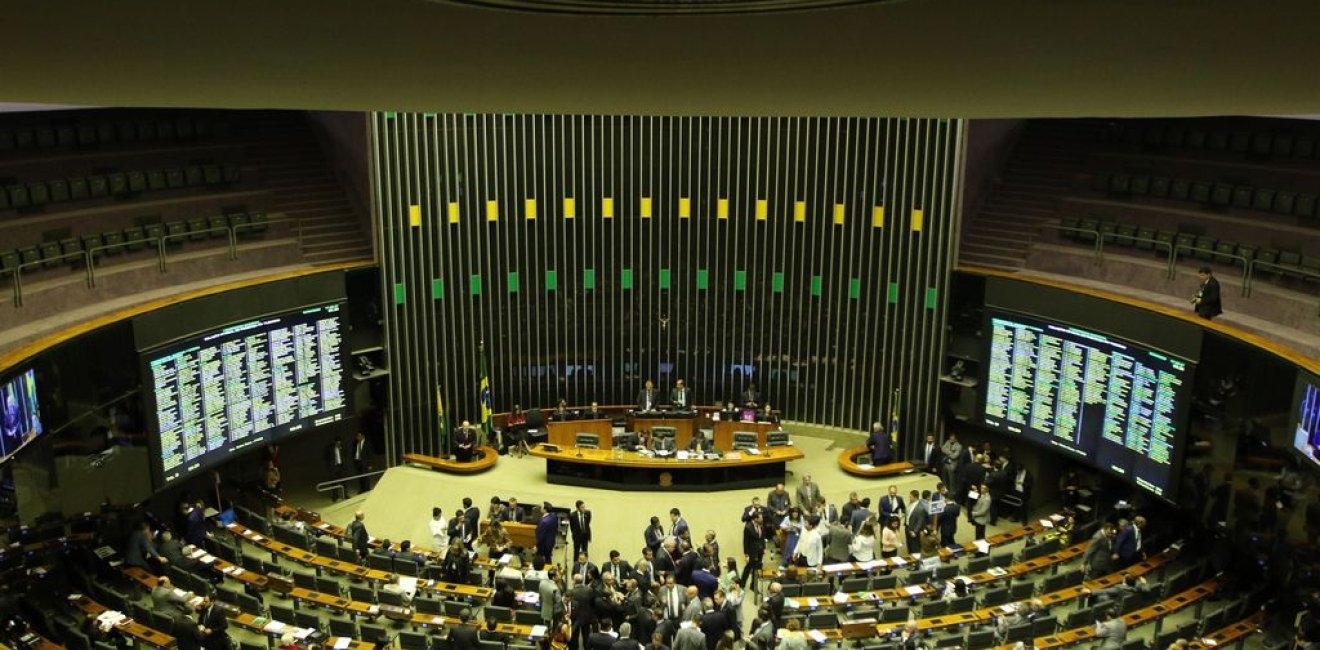The relationship between Jair Bolsonaro and the Brazilian National Congress has been tense since his first year in office. Their latest battle involved a dispute over the control of resources in this year’s budget. A more assertive Congress has led many to see a strengthened legislature as a threat to governance. This is a misconception rooted in the power vacuum created by the Bolsonaro administration, which has purposefully refrained from using its legislative tools.
To fully understand the current tug of war between the president and legislators, it is necessary to examine how legislative institutions have grown stronger over the last two decades. Since the 2000s, Congress has played a more active role to both offset a powerful executive branch and become a greater proponent of legislation. However, a stronger legislature does not necessarily imply a weaker presidency. Under normal circumstances—with a more proactive executive branch that maintains a stable legislative coalition—the strengthening of Congress could be a positive development for Brazilian democracy.
Congress as a Counterbalance
The 1988 Constitution gives extensive policymaking powers to presidents. Political scientists Matthew Shugart and John Carey have ranked Brazilian presidents as among the most powerful in the world. Unlike their U.S. counterparts, presidents in Brazil can initiate any type of bill in Congress. Recent institutional reforms by the legislative branch have promoted changes in the presidential prerogatives to issue provisional decrees and decide the budget.
Like executive orders in the United States, provisional decrees in Brazil have the force of law. Prior to 2001, provisional decrees were valid for 30 days and could be indefinitely re-edited by the presidency if Congress did not vote on them within this period. Frustration with the overuse of executive decrees led lawmakers in 2001 to enact the Constitutional Amendment 32, which explicitly disincentivizes the use of provisional decrees.[1] First, it prohibits indefinite re-editing by the executive. Decrees are now valid for 60 days and can only be edited and re-issued once if Congress does not approve the decree within the 60-day period. Second, Congress is required to vote on provisional decrees within 45 days. Should Congress fail to hold a vote, decrees go to the top of the legislative agenda and supersede all other bills. The maximum life span of provisional decrees is 120 days (the initial 60 days, followed by one renewal of 60 days)—after that, the decrees become invalid and Congress must legislate their provisions through legislative decrees. Third, Amendment 32 also prohibits the presidency from issuing decrees on several issues, including criminal law and civil procedure, citizenship, political rights, and electoral legislation.
Scholars have disagreed about the effects of the 2001 reform. On the one hand, Carlos Pereira, Timothy Power and Lucio Rennó find that the amount of new provisional decrees did not decrease; on the contrary, they argue the reform induced Fernando Henrique Cardoso and Luiz Inácio Lula da Silva to use more decrees than previous presidents. On the other hand, Fabiano Santos and Acir Almeida argue this increase is rooted in the use of provisional decrees to open additional credits to the budget. They observe that, after excluding decrees related to the budget, the number of provisional decrees was substantially lower after Constitutional Amendment 32.
In 2009, another institutional reform targeting executive orders further strengthened the role of Congress in counterbalancing the executive’s agenda. One provision of Constitutional Amendment 32 was the trancamento da pauta, i.e., the blockage of the congressional agenda due to the need to vote on a provisional decree. From 2001 to 2006, 60 percent of congressional sessions were halted because provisional decrees were not voted on within 45 days. In March of 2009, Deputy Regis de Oliveira asked a questão de ordem (a procedural inquiry) of Michel Temer, who at that time was the president of the Chamber of Deputies. Oliveira asked for clarification of the type of legislative proposal that should be affected by the blockage of the congressional agenda. Temer’s response reinterpreted Amendment 32, making it more flexible. According to Temer, only ordinary law proposals should be halted (not voted on) due to the need to vote on provisional decrees: that is, resolutions, constitutional amendments, complementary laws and legislative decree proposals should not be blocked. Recent research has found that a substantial percentage of bills on the congressional agenda were eligible for inclusion only because of Temer’s decision.
More recently, congressmen have made changes to the rules regarding budgetary amendments. Every year, the executive branch drafts a budget law and sends it to Congress for approval. Although legislators have had little ability to change the proposal, one of their prerogatives is to amend the budget. Through amendments, congressmen allocate a small part of the budget to their constituencies by funding health or infrastructure projects, among other areas. Prior to 2015, the Executive branch decided which funds from these budgetary amendments would be spent, and when. The budget reforms of 2015 and 2019, however, stipulated that the executive branch must spend funds proposed both by individual lawmakers or groups of lawmakers from the same state. The latest dispute between the Bolsonaro administration and Congress involved an attempt of legislators to enact a third change that would make spending obligatory for amendments proposed by the rapporteur for this year’s budgetary law.
Congress as a Lawmaker
After the 1988 Constitution was ratified, the executive was the primary player behind every major policy reform in Brazilian politics. This equilibrium started shifting in the 2000s. The political scientist Acir Almeida highlighted 2009 as the year in which the Brazilian Congress—for the first time ever—passed more laws and complementary laws proposed by legislators than by the presidency. In that congressional session (2007-2010), 371 laws were legislator-sponsored; this was more than three times the 113 president-sponsored laws passed in Congress. The number of laws sponsored by the presidency dropped to 86 in the next congressional session (2011-2014), while 297 laws were proposed by congressmen. Between 2015 and 2018, the most recent session, lawmakers approved 369 of their own bills, while only 42 executive-sponsored bills became law.[2]
Approved laws that originate within the legislature often deal with substantive and national issues. Research by Octavio Amorim Neto and Fabiano Santos suggests that 66 percent of the legislation proposed by Brazilian deputies between 1985 and 1999 prioritized national issues. Such bills can also be found in more recent congressional sessions. In 2012, Congress passed a national policy for urban mobility that seeks to stimulate the usage of public transportation in Brazil’s municipalities. The bill was proposed by deputy Alberto Goldman in 1995. Four senators, who served as rapporteurs of the bill, played an important role in its approval: Flexa Ribeiro, Renan Calheiros, Eduardo Amorim and Luiz Henrique.
Furthermore, legislators have increasingly been co-policymakers of bills originated in the executive branch. For instance, Federal Deputy Angelo Vanhoni was a key actor in crafting the National Plan of Education as the bill’s rapporteur. The bill, proposed by the executive branch, sets goals for education between 2011 and 2012. As a rapporteur, Vanhoni analyzed almost 3,000 amendments to the bill. He also worked with civil society organizations to change its content in important ways – including the maintenance of specialized educational assistance for students with disabilities. The bill was sanctioned by former president Dilma Rousseff without any vetoes. In other words, Vanhoni sustained a dialogue with both the executive branch and civil society about the policy, enriching the quality and increasing the acceptability of the bill among key policy actors. This is a prime example of what Congress can achieve as a more active policymaker.
The Implications of a Stronger Congress
Political scientist Carlos Pereira has argued that recent congressional activism is detrimental to Brazilian democracy. He asserts that strong constitutional powers are a necessary condition for presidents to be able to govern in multiparty presidential systems. This arrangement would avoid the institutional gridlock observed from 1946 and 1964, when presidents left office through a coup, suicide or resignation. His argument centers on Bolsonaro’s passivity vis-à-vis the legislative branch: that the current president has abstained from using his policy and budgetary prerogatives to govern as previous presidents governed. However, Pereira seems to perceive increasing congressional activism as an inherent risk to governance, regardless of who occupies the presidency. In order to avoid cyclical majorities that work on a short-term basis, the executive branch must be the main protagonist of policy change. In this scenario, he writes, the best role that the legislative branch can undertake is to be reactive to presidential prerogatives.
A problematic assumption behind Pereira’s understanding of congressional activism is the idea that it is a recent phenomenon. It is not. Legislators have been playing a more active role in Brazilian democracy throughout the last two decades. Indeed, in 2009—the first year in which more legislator-sponsored bills passed than president-sponsored ones—the president was Luiz Inácio Lula da Silva. His administration played a strong role in driving policy change and Lula used the legislative tools at his disposal to govern. He also maintained a multi-party coalition in the legislature that supported the approval of his policies. This all happened while Congress was becoming stronger.
Thus, we should be careful not to equate a stronger Congress with a change in the overall balance of power between branches. The current tension between the executive and the legislature is the result of a power vacuum left by the Bolsonaro administration, which has purposefully refrained from using its constitutional prerogatives. There are several reasons why we should look at the empowerment of legislators with optimistic eyes. One of them is mentioned by Pereira himself: the legislative branch assembles a plethora of societal interests (as opposed to the president, who arguably represents a smaller segment of society). That is, Bolsonaro was elected with support from several segments of society, but he certainly does not represent the Brazilian electorate as fully as does the National Congress. Furthermore, if well equipped to do so, Congress can serve as a co-policymaker to the presidency, potentially improving the quality of the debate about policies, their acceptability among political actors, and the likelihood of their successful implementation. A stronger Congress does not need to be detrimental to Brazilian democracy. It only presents a challenge to governance when presidents remain unengaged in the legislative process.
[1] A survey conducted by Timothy Power and Cesar Zucco Jr. with legislators in 2001 reveals that 60% of them disagreed with the need to give the president the power to issue provisional decrees at the time.
[2] It is possible that legislators proposed bills on behalf of presidents during these periods. This could be the case for years during which presidents maintained stable coalitions in Congress. Instead of proposing bills directly, the presidency could have relied on its coalition to pursue the Executive’s legislative agenda.







